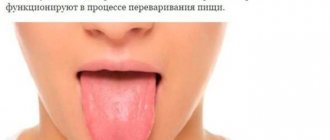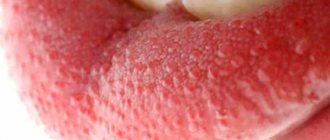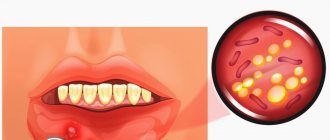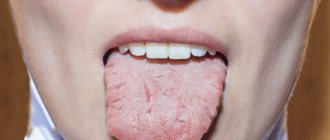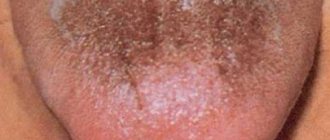Everyone has had to deal with unpleasant sensations in the mouth, but not with a burning sensation. This symptom is not very common, which is why it takes many people by surprise. The patient is not entirely clear what to do and who to contact.
There are several causes of burning in the mouth and tongue
, and in order to correctly prescribe treatment, the specialist will first have to go through all possible options, prescribe a comprehensive diagnosis and identify the disease that provoked such symptoms.
Dental causes of burning sensation in the mouth
When the first symptoms appear, you should contact your dentist, because most often the reasons are related to his profile:
- Oral candidiasis
A burning sensation in the mouth and tongue after prosthetics or filling in most cases indicates poor quality of the procedure. The dentist could damage the mucous membrane during the operation or incorrectly manufacture the prosthesis itself. Some patients are allergic to the filling composition.
- With candidiasis, the tip of the tongue stings the most, there is a feeling that the palate is burned, and there is a bitter taste. Sometimes there is pain in the throat area. The disease manifests itself due to the active proliferation of yeast fungus against a background of weakened immunity.
- Stomatitis
The cause of the disease can be glossitis. With this disease, due to the action of viruses and bacteria, the entire mucous membrane of the tongue experiences a strong burning sensation.
- Aphthous stomatitis is another disease that causes a burning sensation in the mouth. With it, small ulcers form on the mucous membrane, which hurt when touched. There is an unpleasant sensation in the mouth, like a burn from hot drinks.
Why does my tongue sting?
Physiological reasons
In healthy people, a short-term tingling of the tongue is observed after eating certain foods: tomatoes, onions, garlic, herbs, spices, hot seasonings, pickles, marinades.
Often provoked by berries, sour fruits (lemon, kiwi, pineapple). Drinks that can cause the development of symptoms include kefir, some juices, strong tea, coffee, alcohol, primarily wine. Sometimes hot drinks or food cause superficial burns of the mucous membrane. In this case, the tingling is intense, complemented by tingling and burning. The sensation is also typical for heavy smokers and is associated with constant irritation of the tongue from tobacco smoke. Sometimes the disorder occurs while taking antidepressants, antibiotics, antiemetics, sedatives and hormonal drugs.
Glossalgia
It is a functional disorder, often develops against the background of gastrointestinal diseases, endocrine and neurological pathologies. Pinching, burning and rawness of the tongue during glossalgia can be periodic or constant, causing rapid fatigue when speaking, and is accompanied by dry mouth. Mostly it occurs in the area of the tip and side surfaces. The symptom intensifies against the background of excitement, disappears or weakens when eating. External changes, as a rule, are absent.
Glossodynia
Along with tingling and tingling, patients may complain of a hairy sensation or “crawling sensation.” The symptom is more pronounced in the tip area and can spread throughout the entire tongue. The root rarely suffers. Characteristic is the spread of the affected area and an increase in the duration of discomfort as glossodynia progresses. Manifestations increase in the evening, sometimes bother you all night, and disappear during meals. The disorder is observed in the following diseases:
- Lesions of the digestive system:
gastritis, gastric ulcer, cholecystitis, pancreatitis, colitis. - Endocrine pathologies:
diabetes mellitus, thyroid dysfunction. - Cardiovascular problems:
hypertension, atherosclerosis, ischemic heart disease. - Neurological dysfunction:
vegetative-vascular dystonia, functional disorders due to stress, neuroses, psycho-emotional exhaustion.
Tongue tingling
Desquamative glossitis
In most cases, the pathology is asymptomatic, however, some patients complain of changes in taste sensations, tingling, and pinching of the tongue. Diction problems are possible. Upon examination, multiple whitish areas are revealed, which, after peeling off the epidermis, turn into red spots. Desquamative glossitis can accompany the following conditions:
- Gastroenterological problems:
gastritis, enterocolitis, cholecystitis, hepatitis. - Autoimmune diseases:
rheumatism, systemic scleroderma, SLE. - Chronic dermatoses:
psoriasis, exudative diathesis. - Hypovitaminosis:
deficiency of vitamins B1, B2, B5, B6, B12.
Sometimes it develops during pregnancy and worries patients with pathologies of the hematopoietic system and autonomic disorders. Some patients have a hereditary predisposition.
Dental diseases
A common cause of tingling, pain and burning are dental diseases: caries, tartar deposits. The symptom occurs when the edge of the tongue is damaged by a tooth fragment, prosthesis or crown; the damage is local in nature. Sometimes the cause of development is an individual reaction to the prosthetic material. In such cases, itching, irritation and redness of the mucous membranes are observed.
Xerostomia
Due to an insufficient amount of saliva, the tongue dries out, and a feeling of tingling, tightness, and tingling occurs. The disorder is aggravated by eating hard, dry foods or talking for a long time. Over time, the changes progress, and the discomfort becomes permanent. To reduce the severity of symptoms, patients often drink water or rinse their mouth. Taste sensations are reduced or distorted. Xerostomia can be diagnosed in the following cases:
- Endocrine pathologies:
hyperthyroidism, diabetes mellitus. - Diseases of the salivary glands:
tumors, mumps, calculi. - Dehydration:
fever, increased sweating, repeated vomiting or diarrhea. - Infectious diseases:
HIV, some other viral infections. - Other reasons:
condition after radiation therapy, frequent or prolonged stress.
Oral candidiasis
Pinching, discomfort, tingling are detected in the chronic form of the disease. Acute candidiasis is often manifested by pain and burning. The unpleasant sensations are widespread, covering the tongue and oral mucosa. The affected areas are covered with a dense gray coating, which, when removed, reveals a bright red inflamed epithelium. With hyperplastic candidiasis, the mucous membranes become painful and rough. Atrophic candidiasis is localized, the lesions are located next to the dentures and are areas of erythema with clear boundaries.
Allergic reactions
The most common etiological factor for tingling is food allergy. The symptom can also be observed in a reaction to pollen, house dust, animal dander and other allergens. Severe itching predominates, which forces the patient to “scratch” the affected area with his teeth, may be supplemented by tingling of the tongue, and is accompanied by sneezing and lacrimation.
What disease can cause a burning sensation in the mouth?
If there is fever and general malaise, as well as other additional symptoms, the source should be sought in more serious diseases:
- The cause of a burning sensation in the mouth and throat is sometimes hidden in disorders of the gastrointestinal tract (GIT). Most often, people suffering from colitis or pancreatitis have to deal with this symptom.
- The patient may only feel that his mouth is baking and bitter. This is how the body reacts to serious stress; in such a state, the human body can behave unpredictably.
A feeling of dryness and burning in the mouth is one of the most common signs of both types of diabetes.
- Hormonal imbalance, especially at the very beginning of menopause, can cause burning in the gums. In this case, bitterness is sometimes felt on the tongue.
- Sjögren's syndrome does not appear so often, but still it should not be written off. The disease is called dry syndrome, since for no apparent reason it causes a disruption in the secretion of external glands, which ultimately leads to xerostomia - lack of saliva.
- Sometimes an acute deficiency of nutrients, primarily folic acid and vitamin B12, leads to the symptom. Usually in such cases it is the palate in the mouth that burns.
Causes of heartburn in the throat
Burning and discomfort in the throat can occur in completely healthy people. The most common cause of such symptoms is errors in diet: abuse of spicy or salty foods, caffeine-containing drinks, which cause an increase in the production of hydrochloric acid, causing it to be thrown into the throat. Heartburn can also be caused by smoking and frequent alcohol consumption. A burning sensation is often observed in pregnant women, especially in the second and third trimesters, which is associated with an increase in intra-abdominal pressure and a reflex opening of the cardiac sphincter.
Laryngopharyngeal reflux (LPR)
The backflow of aggressive stomach contents into the cavity of the pharynx and larynx is the main cause of heartburn in the throat. The mechanism of the disease is associated with uncoordinated work of the upper and lower sphincters of the esophagus with constant relaxation of the sphincters of the hypopharynx. As a result of regurgitation (backflow) of liquid contents with a pH below 4, the mucous membrane of the throat is irritated. An important role in the progression of laryngopharyngeal reflux is played by disruption of the reflex reactions of the larynx to an irritant.
The clinical picture of LPR is characterized by a combination of heartburn and nonspecific respiratory complaints: episodic dry cough, mucous discharge from the oropharynx, increased production of saliva. Sometimes the sensation is described by patients as a squeezing “lump in the throat.” An important sign of the disorder is the aggravation of unpleasant symptoms in a horizontal position, due to the entry of more gastric juice into the upper respiratory tract.
Disorders of the acid-producing function of the stomach
The appearance of heartburn can be caused by increased production of hydrochloric acid by the lining cells of the body of the stomach, which provokes the opening of the cardiac sphincter and the reflux of chyme (liquid, partially digested food) into the pharynx. Often the symptom is combined with burning and soreness behind the sternum. A discomfort in the throat also develops due to decreased acid production and stagnation of chyme. In this case, the unpleasant sensations are potentiated by organic acids, which are produced in large quantities during the decomposition of food in the stomach. Typically a burning sensation in the throat is caused by:
- Gastritis
. At the initial stages of mucosal inflammation caused by exposure to bacterial flora, the production of hydrochloric acid increases significantly. A decrease in the pH of gastric juice in combination with uncoordinated contractions of the sphincters leads to the reflux of contents into the overlying sections of the gastrointestinal tract with a feeling of heartburn in the throat. The disease is also manifested by sour belching, constipation and epigastric pain. - Peptic ulcer disease
. The formation of an ulcerative defect in the mucosa, caused by an increase in aggressive factors and a decrease in protective factors, always occurs with pronounced dyspeptic disorders. With a gastric ulcer, heartburn is caused by impaired motility and gaping of the cardiac sphincter. With duodenal ulcers, duodenal-gastric reflux is observed, against the background of which the mucous membrane of the throat is irritated by duodenal contents. - Gastrinoma
. A gastrin-producing tumor located in the pancreas or antrum of the stomach provokes an uncontrolled increase in the secretion of hydrochloric acid, which does not depend on food intake. In this case, sour belching, heartburn in the throat and burning behind the sternum, severe pain in the epigastric region are determined. The condition is aggravated by the addition of steatorrhea, which develops when food is malabsorbed. - Pyloric stenosis
. The transition between the stomach and duodenum is often narrowed due to cicatricial processes in the pylorus, which is accompanied by inhibition of hydrochloric acid production and causes prolonged stagnation of partially digested food masses. As a result, macromolecules decompose with the formation of organic acids. Stretching the gastric wall triggers reverse peristalsis and promotes acid reflux into the pharynx. - Atrophic gastritis
. The disease is of an autoimmune nature or occurs in the late stages of bacterial gastritis, when the lining cells of the mucous membrane are completely destroyed. Heartburn is associated with increased formation of lactic and pyruvic acids due to decomposition and putrefaction of undigested food. The burning sensation is combined with rotten belching, vomiting of eaten food, alternating constipation and diarrhea.
Other diseases of the digestive system
The feeling of heartburn in the throat often indicates diseases of the underlying parts of the digestive system. Burning and pain in the laryngopharynx are sometimes detected with irritation and erosion of the mucous membrane due to the ingress of small intestinal contents with a large amount of bile acids. Secondary disorders of the motor function of the smooth muscles of the gastrointestinal tract and incoordination of the gastric sphincters aggravate the symptoms. The main causes of heartburn are:
- Duodenitis
. Dyspeptic disorders, along with pain, are the main signs of inflammation of the duodenum. A burning sensation in the throat occurs due to the irritating effect of hydrochloric acid and bile acids on the mucous membrane of the pharynx. Unpleasant sensations are combined with nausea and vomiting, a tendency to unstable stools, and bitter belching. The cholecyst-like form of the disorder occurs as biliary colic. - Enzyme deficiency
. Heartburn with a decrease in exocrine pancreatic function is a sign of exacerbation of chronic pancreatitis and gastrointestinal motility disorders caused by duodenogastric reflux. Characteristic signs are steatorrhea and lientorrhea - the discharge of loose, grayish stool with undigested food debris. Malabsorption leads to rapid weight loss. - Perisplenitis
. Heartburn due to inflammation of the spleen capsule usually has a neuro-reflex nature and is caused by impaired gastric motility. The symptom is accompanied by burning pain in the left hypochondrium, which radiates to the scapula, left arm and cardiac region. A typical combination of pain with an increase in body temperature and signs of general intoxication of the body. Unpleasant manifestations intensify with physical activity, coughing, sneezing. - Adductor loop syndrome
. Frequent episodes of stagnation of digested food in the blind part of the intestine in diseases of the operated stomach lead to distension of the intestine and its throwing back into the stomach. The smooth muscles of the gastric wall reflexively contract, then aggressive chyme enters the esophagus and pharynx. In addition to burning sensations in the throat, vomiting after eating, a feeling of heaviness and fullness in the epigastrium, and weight loss are possible.
Neurological diseases
Dyspeptic disorders in pathologies of the central nervous system are often provoked by dysregulation of the autonomic innervation of the abdominal organs. Symptoms such as heartburn, nausea, and abdominal pain are usually signs of visceral paroxysms. Unpleasant sensations from the gastrointestinal tract are often combined with other types of autonomic reactions: pallor, increased sweating, rapid heartbeat. A burning sensation in the throat area is caused by:
- Temporal lobe epilepsy
. Heartburn and other dyspeptic disorders arise due to the involvement in the pathological process of the autonomic centers responsible for the innervation of internal organs. These symptoms manifest themselves both as individual somatosensory paroxysms and as an “aura” before a typical epileptic attack. Over time, epilepsy leads to emotional and intellectual impairment. - Alcoholic encephalopathy
. Burning sensation, discomfort in the throat, nausea and vomiting, and bowel movements are warning signs of the disease. They are associated with the local and general toxic effects of ethanol and its metabolites. The full clinical picture of the disease is characterized by visual and auditory hallucinations, alternating periods of chaotic excitation and depression of the central nervous system. In severe cases, brain dysfunction develops into psychoorganic syndrome and dementia.
Itsenko-Cushing's disease
Heartburn with overproduction of adrenal hormones is formed due to increased production of gastrin and hydrochloric acid in the stomach. A decrease in the acidity of gastric juice and impaired motility of the upper parts of the digestive tract cause the flow of acidic contents into the laryngopharynx. In addition to dyspepsia, in Itsenko-Cushing's disease, pathognomonic signs of the pathology are determined: Cushingoid appearance (significant fat deposits in the torso area, moon-shaped face), purple stretch marks (skin stretch marks) on the thighs and abdomen, cardiovascular pathology.
Viral infections
The combination of dyspeptic disorders with respiratory symptoms is characteristic of measles in young children. Periodic reflux of gastric chyme is associated with functional disorders of gastrointestinal motility due to general intoxication and the specific action of the pathogen. Heartburn in the throat is a secondary nonspecific symptom that occurs against the background of the main manifestations: lacrimation, serous rhinitis, dry cough. The destruction of the epithelial layer under the influence of viral particles aggravates the burning sensation in the laryngopharynx.
External reasons why it may bake in the mouth
Sometimes unpleasant sensations on the palate and tongue appear due to the occurrence of a serious illness, and it happens that the mucous membrane stings due to the influence of external factors that are easy to eliminate:
- Most often, the cause of baking in the mouth is mechanical damage to the mucous membrane.
People can injure their tongue and lips while eating; less often, poor-quality dental care leads to damage to the oral mucosa. - If the palate and tongue are burned by hot food or drinks, the discomfort will continue for at least a few more days. Sometimes the burning sensation continues after the tissue has healed.
- You may develop an allergic reaction to oral care products. For many, this symptom is caused by the presence of sodium lauryl sulfate in toothpaste. It dries out the mucous membrane, which gradually provokes itching and a feeling that the person’s whole mouth is on fire. It is better to put such pastes away.
- Taking some medications can also have unpleasant side effects. The most common causes of burning are iodine-containing medications, antihypertensive drugs when taken uncontrolled, and vasoconstrictors.
A feeling similar to that of a burn to the mucous membrane is often a side effect of chemotherapy.
Diagnosis of burning in the mouth
In most cases, burning of the oral mucosa is not at all associated with diseases of the teeth and gums. Despite this, if you feel itching, you should first contact your dentist, especially if you have recently had prosthetics or fillings done.
The specialist will examine the oral cavity and, if dental problems are detected, prescribe the necessary treatment. In addition, the dentist can give recommendations on how to eliminate dry mouth, because it is the precursor to discomfort. In this case, even traditional methods will be useful.
If the dentist was unable to cure the patient, he will have to undergo a series of tests and examinations by a neurologist, gastroenterologist, otolaryngologist and endocrinologist. First of all, blood is collected and a swab is taken from the tongue. Once the original disease is identified, the patient will be prescribed the correct treatment.
Treatment for burning sensation in the mouth
First of all, you need to find out the cause of the burning sensation in the mouth. If the problem is related to diseases and conditions of the oral cavity and teeth, then in the dental clinic the patient is given one or more of the following measures:
- Professional teeth cleaning – removal of plaque, stone, sanitation of the oral cavity.
- Treatment of dental diseases - caries, pulpitis.
- Treatment of gum diseases – gingivitis, periodontitis.
- Assessment of the condition of dentures and their effect on the oral mucosa. If necessary, prosthetic structures are replaced.
In addition to the above procedures, therapeutic measures for burning in the mouth also include taking anti-inflammatory, antibacterial or antifungal (for candidiasis) drugs. If there is a lack of vitamins and minerals, a course is prescribed to replenish the missing biologically active substances. Some patients are prescribed physical therapy.
Treatment of burning sensation in the mouth and tongue
The emphasis is on eliminating the cause of the burning sensation in the mouth, but additional measures necessary to alleviate the symptoms are also prescribed.
Treating the underlying cause of pinching
If it becomes clear that the cause of the burning sensation in the mouth lies in a serious disease, first all efforts will be directed specifically at eliminating it. A therapist or specialist doctor may prescribe the following treatment:
- If an allergy is detected, the patient is prescribed antihistamines. It is recommended to completely avoid contact with the allergen.
- In case of a lack of nutrients, which has led to unpleasant sensations in the mouth and tongue, special medications are prescribed. Moreover, preference is given not to complexes, but to those products that contain only the necessary substances. In this case, these include B vitamins and folic acid.
Fungal diseases should be treated with antibiotics and disinfectant rinses.
- If problems with hormonal levels are detected, a thorough examination is first carried out, which can take more than one month. All this time, the patient is prescribed medications that relieve the burning sensation in the throat and tongue, and only at the very end are hormonal medications prescribed.
- For diabetes, medications are also recommended that can alleviate the patient’s condition. The main treatment is medication and diet, which you will have to follow for the rest of your life.
- If the mucous membranes of the mouth, tongue and lips “burn” due to stress or dry syndrome, the patient will have to visit a neurologist, and sometimes even a psychologist. Usually in such cases it is most difficult to eliminate dryness and burning, since the causes of such symptoms are not completely clear.
Treatment for burning mouth at home
Treatment is divided into two stages: addressing the underlying cause and taking steps to relieve symptoms.
One without the other will be ineffective. To relieve the patient from burning of the oral mucosa, the following recommendations are usually given:
- Regular rinsing of the mouth with diluted antiseptics: Chlorhexidine, Furacilin, Miramistin. The composition is not so important, the main thing is that the product gets rid of bacteria.
- If there are damage to the mucous membrane, it is necessary to treat them with iodine-based ointments or other drugs that promote rapid healing.
- You can get rid of a burning sensation in the mouth using ointments with an anesthetic effect. Remedies such as Kamistad and Lidocaine are excellent for pain relief.
- If your mouth is dry, the symptom can be treated with folk remedies. Rinsing with the addition of sea buckthorn oil will help best.
The list may be longer if there are other symptoms, such as fever or general malaise.
Diagnostics
Determining the cause of tongue tingling is the responsibility of a dentist. If the presence of provoking diseases is suspected, patients are referred to therapists, gastroenterologists, neurologists, and other specialists. The survey program includes activities such as:
- Dental examination.
Depending on the etiology of the symptom, tartar, poorly fitting dentures, carious teeth, dry mucous membranes, focal or diffuse changes in the tongue, cheeks and gums may be detected. Additionally, the acidity of saliva is determined and the potential difference is measured. - Neurological examination.
Informative for glossodynia. The results reveal the absence of curtain and pharyngeal reflexes, rhythmic trembling of the tongue. The submandibular and upper cervical vegetative nodes are painful when touched. According to electromyography, the prevalence and duration of paresthesia is determined. - Examination of the salivary glands.
Recommended to clarify the causes of xerostomia. Based on the results of ultrasound of the salivary glands, congenital anomalies, cysts, tumors, stones, and inflammatory processes are detected. During sialography using a contrast agent, neoplasms and signs of inflammation are detected. - Lab tests.
A general and biochemical blood test is performed to exclude B12-deficiency anemia and hypovitaminosis. If candidiasis is suspected, microscopy of the scraping is indicated. Identification of pseudomycelium is a reason for conducting a microbiological study. - Other techniques.
For secondary diseases that cause tongue tingling, fibrogastroscopy, colonoscopy, ultrasound of the abdominal organs, electrocardiography, echocardiography, and tests for specific markers to determine autoimmune pathologies may be prescribed.
Oral examination
How to prevent burning in the future
In order not to encounter a burning sensation of the tongue and oral mucosa, you need to follow preventive measures:
- Try to sleep at least 7-8 hours a day. This will protect you from stress and weakened immunity - phenomena that often provoke a feeling of heat on the mucous membrane.
- Any bad habits, be it cigarettes or alcohol, must be eliminated from your lifestyle.
- Follow the basics of proper nutrition. Include as many fresh fruits and vegetables in your diet as possible. This is useful not only for teeth and gums, but also for the gastrointestinal tract.
- Maintain good hygiene. Simply brushing your teeth regularly is not enough; you need to visit a specialist once every 6 months, use mouth rinses, dental floss and other aids.
- Pay attention to the composition of hygiene products. If you have sensitive gums and teeth, try to choose toothpastes and rinses with gentler ingredients that do not cause a burning sensation in the mouth.
- Limit your use of chewing gum. Choose only those that do not contain sugar or xylitol.
- Reduce your intake of bitter, hot and sour foods.
- Avoid treating damaged areas with products based on alcohol, potassium permanganate and brilliant green.
When you notice the first unpleasant symptoms, contact a specialist for proper diagnosis and timely treatment.

